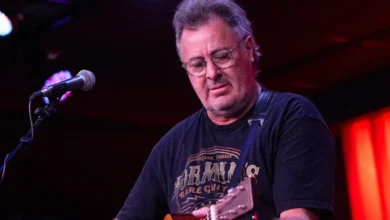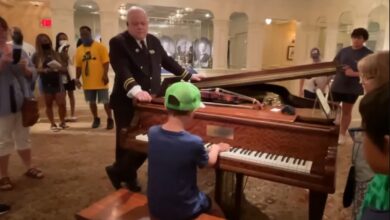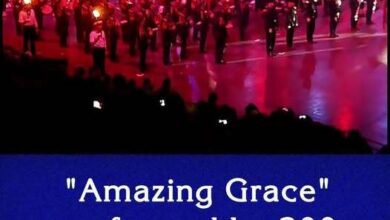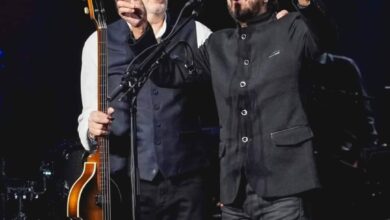Kelly Clarkson’s rendition of ‘The Dance’ moved Garth Brooks to tears
During the 43rd Kennedy Center Honors, which took place on June 6, 2021, a remarkable moment unfolded when Kelly Clarkson took the stage to perform Garth Brooks’ beloved classic “The Dance.” This annual ceremony, known for celebrating exceptional individuals in the arts, honored Brooks alongside other illustrious figures such as Debbie Allen, Joan Baez, Dick Van Dyke, and violinist Midori. The evening was hosted by the Grammy-winning superstar Gloria Estefan and featured an array of performances from renowned artists, including Gladys Knight, Emmylou Harris, and the a cappella group Pentatonix. The blend of talent and artistry created a night to remember for all attendees and viewers.
Clarkson’s rendition of “The Dance” stood out not only for its musicality but for its emotional depth. The song, released in 1989 on Brooks’ self-titled debut album, explores themes of love, life’s fleeting moments, and the inevitability of loss, making it a timeless piece in contemporary music. From the moment she began to sing, Clarkson’s powerful and heartfelt delivery captivated the audience. Her performance was accompanied by a subtle yet poignant piano arrangement, which allowed her vocals to shine while creating an intimate atmosphere. Each note seemed to resonate with the audience, drawing them into the emotional narrative of the song.
Witnessing Clarkson’s emotional connection to the music was Garth Brooks himself, who was visibly moved by her interpretation. As he sat in the audience, it was evident that the performance struck a profound chord within him, evoking tears of appreciation and nostalgia. This heartfelt interaction underscored the unique bond shared between artist and song, illustrating how a performance can transcend time and personal experiences to evoke raw emotion. Clarkson’s rendition served as a beautiful homage not only to Brooks but also reflected her own life experiences, particularly her struggles and personal growth through challenging times.
In her own journey, Clarkson has acknowledged the significance of “The Dance” in her life, especially following her public divorce from Brandon Blackstock. The song’s themes of reflection and acceptance, along with its acknowledgment of life’s complexities, resonated deeply with her. Clarkson has often spoken about how music has been a therapeutic outlet over the years, helping her navigate the emotional landscape of her life. In bringing her interpretation to the stage, she infused the performance with her own story, creating a beautiful synthesis of past and present, pain and healing.
Kelly Clarkson, born on April 24, 1982, in Fort Worth, Texas, first gained national prominence as the champion of the inaugural season of “American Idol” in 2002. This victory catapulted her into the spotlight, leading to a flourishing career that sees her as one of the preeminent voices in popular music today. With a discography that includes chart-topping hits like “Since U Been Gone,” “Stronger (What Doesn’t Kill You),” and “Piece by Piece,” Clarkson has garnered numerous accolades, including multiple Grammy Awards. Beyond her musical achievements, she has expanded her influence as a television host on “The Kelly Clarkson Show” and as a coach on NBC’s “The Voice,” solidifying her status as a multifaceted entertainer.
The performance at the Kennedy Center Honors illuminated Clarkson’s versatility and her ability to connect with the audience through profound emotion. Not only did she honor Garth Brooks and his contributions to the world of country music, but she also reminded everyone of her ability to convey sincere emotion through her interpretations. Clarkson’s approach to “The Dance” was a masterclass in how to breathe new life into a classic while remaining respectful to its origins. Her emotional delivery and artistry allowed the song to resonate anew, bridging generational divides and showcasing the enduring relevance of Brooks’ work.
The warm reception of Clarkson’s performance took on a life of its own, with audiences both in-person and at home praising her for the emotive quality she brought to the stage. This spectacle reaffirmed the power of music to transcend barriers and touch hearts, particularly in shared spaces like the Kennedy Center, where the celebration of art and culture takes center stage. The performance was recognized as one of the highlight moments of the ceremony, encapsulating the evening’s spirit of reverence and gratitude toward artistic contributions that shape society.
In retrospect, the 43rd Kennedy Center Honors provided a platform for Kelly Clarkson to not only shine as a performer but also to connect deeply with her peers and the audience. The moment served as a reminder of how music can encapsulate life’s emotions, celebrating both joy and sorrow. Clarkson’s heartfelt rendition of “The Dance,” in particular, underscores the enduring legacy of Garth Brooks’ artistry and the powerful resonance of classic songs in the hands of contemporary artists.
As time continues to unfold, the impact of that performance will likely resonate in the memories of those who witnessed it. It stands as a testament to the power and beauty of artistic expression, illustrating how music can inspire, heal, and bring people together. In essence, performances like Clarkson’s at the Kennedy Center Honors exemplify the lasting influence of great music and the way it can bridge generations, create emotional bonds, and foster a sense of shared humanity.
?





